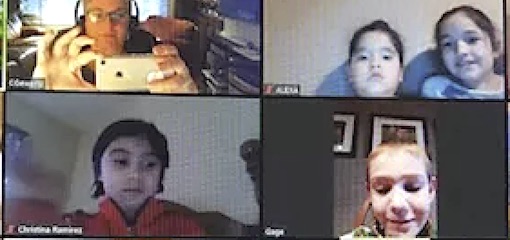Covid-19 Is Showing Us the Cracks and Flaws
A MiddleWeb Blog
 There is a terrible sense of pressure in this Zoom meeting with my grade-band colleagues. Like most teachers in the country, we’ve just invented an online public school within a week.
There is a terrible sense of pressure in this Zoom meeting with my grade-band colleagues. Like most teachers in the country, we’ve just invented an online public school within a week.
We seem to be used to it, ironically – processes tumbling forward, nearly out of our grasp. This turning on a dime, dismissing one initiative to embrace another, learning on the fly, gulping down our lunches in 5 minutes, handling six platforms at once. The enormity of this event, the flexibility and creativity it takes, is immeasurable – and in the thick of it, the enormity is lost on us.
A colleague texted me a message the other day: “Dear Students: You all get an A.” I wonder what would happen if we gave those “A’s” now to our schools as well.
For there is no congratulating one another at the moment, if ever. We just keep going. How can we flip the classroom? Who is making the asynchronous video? How do we grade Google Forms again?
And over and over: the word accountability. How we hold our students accountable. How we hold our parents accountable. How we help parents hold students accountable. How we will be held accountable.
What we are revealing about ourselves
Covid-19 is a red contrast dye. Dumped into the cauldron of schools, it shows us the cracks and flaws that were already there. How we accept dysfunction. How we devalue our contributions. How afraid we are of mistakes, of punishment. As the virus battles us for the ability to breathe, it shows us how teachers in the era of high stakes accountability have always held their breath.
And yet something else is happening. As my students slowly figure out their cameras and microphones, they are coming alive to me and for me in ways I never could have predicted.
For example (unless they’ve figured out how to turn themselves into a potato), I can see their homes now. Students cheerfully tour me through the kitchen, the bathroom, plopping down on the couch with fluffy pillows half hiding the screen. Shy baby brothers and sisters join their siblings at the breakfast table and peer at me. Parents and babysitters duck down to wave.
I hear them whispering technological directions to my students in Spanish through the curtains of their long black hair. Pets and cousins wander through. I get the biggest smiles by bringing my own laptop down to the first floor so everyone can meet my Labrador – something we could never have done otherwise, since animals are not allowed in our building.
What is equity, really?
It seems to me that there is an important message for me here. It is a message about what equity really is.
Practically, of course, equity and inequity smack you in the face when you’re teaching online. The Internet is not a public utility. Free and reduced meals are dependent on whether you can physically get to the school cafeteria. Homes being asked to also be school can be noisy, cold, crowded, abusive.
Education as both an intellectual and a physical equalizer is unrecognizable, and now it is purely a family’s socioeconomic standing that determines the quality of their education during Covid-19. Is that just for now – or always?
Ethically, equity defines itself in what a successful interaction with my students looks like these days. It looks like me taking all the time they need to walk them through submitting a Google Doc. It looks like noticing when they’ve lost a tooth. It looks like me learning to “give up instructional time” to ask three questions in the beginning of every single Meet:
Who is with you in the house today?
What did you have for breakfast?
What do you need?
Equity has our Google Classroom codes. It’s signaling us in the Zoom waiting room. It is reminding us that it is not a “material good.” It is not a “teaching strategy.” It is a way of being. And it is a way of being – focused on seeing and grounded in compassion – in which teachers and students must share alike.
For there is no learning standard for helping students find a closet to close or a blanket to throw over their heads so they can hear you. There is no “I can” statement for determining whether a student can drink the milk in the fridge because they might have to save it for the baby. There is no reward on a standardized exam for prioritizing your students as human beings.
And yet everything we hope to teach in the age of Covid-19 depends on it.
Image: Angie Shaw





































Dina – thanks for a powerful reminder of all that’s missing in our schools today and how critical compassion is if we are to ever truly improve the experience of students. I pray we use the challenges all teachers are facing to confront what should be discarded [e.g., standardized tests et al] and what should be made central as we return to a normal that we’ve learned is very fragile.
You’re very welcome. I’m not anti-standardized tests per se; but I do feel they are symptomatic of an educational culture that is driven by sticks and carrots. There are better ways, for teachers and kids.
Dina,
I agree completely. This pandemic reveals the cracks and flaws in the US education system. Hopefully, history will prove to be an effective teacher and the future of education in this country will shift dramatically over time.
Agreed, Marcia!
I have to admit, that as crazy as this change is, there is an intimacy with my students and their families that I didn’t have before. I think we are going to come out of this learning, or relearning, that it is our connections that make education possible. Thanks for sharing your experience.